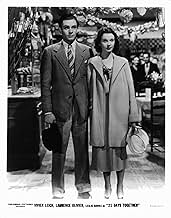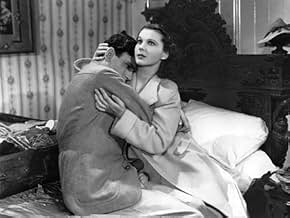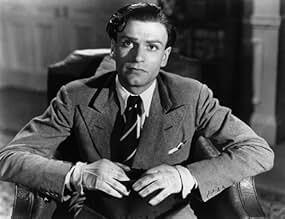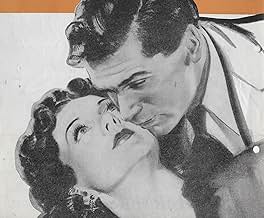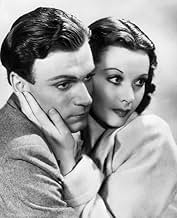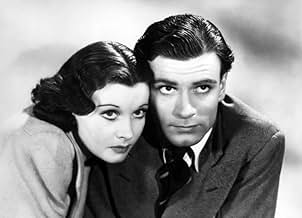21 Days Together
Original title: 21 Days
- 1h 12m
IMDb RATING
6.1/10
1.4K
YOUR RATING
After Larry accidentally kills his lover Wanda's estranged blackmailing husband, someone else is arrested for the crime. Larry and Wanda nervously await the verdict: if the innocent suspect ... Read allAfter Larry accidentally kills his lover Wanda's estranged blackmailing husband, someone else is arrested for the crime. Larry and Wanda nervously await the verdict: if the innocent suspect is found guilty then Larry will give himself up.After Larry accidentally kills his lover Wanda's estranged blackmailing husband, someone else is arrested for the crime. Larry and Wanda nervously await the verdict: if the innocent suspect is found guilty then Larry will give himself up.
- Director
- Writers
- Stars
Elliott Mason
- Frau. Grunlich
- (as Elliot Mason)
Howard Douglas
- Man Asking for Cigarette
- (uncredited)
- Director
- Writers
- All cast & crew
- Production, box office & more at IMDbPro
6.11.3K
1
2
3
4
5
6
7
8
9
10
Featured reviews
A stronger, more compelling drama than I expected
Of all the dramas that have ever graced the Silver Screen, some are better than others. Save for the very noteworthy cast, I don't know that there's anything so remarkable about '21 days' as to demand viewership. Yet its tale is suitably compelling to keep one watching, with surprising variety and balance squeezed into only 72 minutes. I didn't necessarily expect much when I sat to watch, but ultimately I find myself quite pleased with just how good this is.
Weirdly enough all the most significant characters are sympathetic in one fashion to another, if to different degrees: Wanda, the innocent romantic; Larry, the conflicted lover; Keith, the upstanding citizen and loyal brother; John Evan, the extraordinarily guilt-ridden vagrant. The dynamics between these characters, and the law's investigation of a homicide, provide all the fuel necessary for a slight but delicious film. Even outside those principle characters, other supporting figures are given delightful quirks to help them stand out. The dialogue is quite smart at points, as is the scene writing, and the narrative at large offers a tad more complexity than one might commonly assume of titles form this era, especially those of such relatively abbreviated length. Through to the very end '21 days' rather successfully inculcates minor airs of tension and suspense. My commendations to director Basil Dean and co-writer Graham Greene, for their adapted screenplay is richer than I supposed from the outside looking in.
True, there are tinges of ham-handedness at points that are a little excessive. The transitions that the editors employ are a bit needlessly embellished. Yet these seem like such minor considerations in the grand scheme of things, especially when the whole is broadly so engaging and satisfying. Vivien Leigh and Laurence Olivier have splendid chemistry and give noteworthy performances in what are the two chief roles; Leslie Banks and other co-stars are steady presences. Dean's direction is firm and mindful, neatly complementing his writing, and all facets of the production contributed from behind the scenes are just swell. This may be a picture in which the storytelling is specifically the key, but no one involved was a slouch by any means.
Again, this may not be an absolute must-see, or something to go out of your way to see. It's entertaining and very deserving, but perhaps not so grabbing as to be an essential drama. All the same, I'm pleasantly surprised by how well done the feature is, and how enjoyable. If you do have the chance to check out '21 days, then as far as I'm concerned this is well worth a mere 72 minutes of one's time.
Weirdly enough all the most significant characters are sympathetic in one fashion to another, if to different degrees: Wanda, the innocent romantic; Larry, the conflicted lover; Keith, the upstanding citizen and loyal brother; John Evan, the extraordinarily guilt-ridden vagrant. The dynamics between these characters, and the law's investigation of a homicide, provide all the fuel necessary for a slight but delicious film. Even outside those principle characters, other supporting figures are given delightful quirks to help them stand out. The dialogue is quite smart at points, as is the scene writing, and the narrative at large offers a tad more complexity than one might commonly assume of titles form this era, especially those of such relatively abbreviated length. Through to the very end '21 days' rather successfully inculcates minor airs of tension and suspense. My commendations to director Basil Dean and co-writer Graham Greene, for their adapted screenplay is richer than I supposed from the outside looking in.
True, there are tinges of ham-handedness at points that are a little excessive. The transitions that the editors employ are a bit needlessly embellished. Yet these seem like such minor considerations in the grand scheme of things, especially when the whole is broadly so engaging and satisfying. Vivien Leigh and Laurence Olivier have splendid chemistry and give noteworthy performances in what are the two chief roles; Leslie Banks and other co-stars are steady presences. Dean's direction is firm and mindful, neatly complementing his writing, and all facets of the production contributed from behind the scenes are just swell. This may be a picture in which the storytelling is specifically the key, but no one involved was a slouch by any means.
Again, this may not be an absolute must-see, or something to go out of your way to see. It's entertaining and very deserving, but perhaps not so grabbing as to be an essential drama. All the same, I'm pleasantly surprised by how well done the feature is, and how enjoyable. If you do have the chance to check out '21 days, then as far as I'm concerned this is well worth a mere 72 minutes of one's time.
disappointed
I was disappointed in this film, but it's my own fault. I went into it thinking it was some marvelous mystery or noir.
"21 Days Together" has an interesting history. Released in 1940, it was actually made in 1937 but for some reason not released. After Gone with the Wind, I suppose there was a lot of interest in Leigh and the film was released.
The Leigh role was to be played by Vera Zorina, but obviously she didn't do it and Leigh won the role.
The story concerns a young couple in love, but the woman, Wanda (Leigh) is married but not living with her husband. He shows up and attempts blackmail, but gets into a fight with her lover Larry (Olivier) who accidentally kills him.
A man who stole something off of the body is arrested for murder and found guilty. The couple has three weeks together before Larry must give himself up or let an innocent man hang. His brother, who is up for a judgeship, is determined that Larry not admit to the crime.
This film was not close-captioned and, as I am a little hard of hearing, it was difficult to understand some of the dialogue.
I found this an okay drama, well acted for the most part.
Leigh and Olivier made a beautiful couple, and it's always nice to see them together, young and in love. Makes you sad about how it ended.
"21 Days Together" has an interesting history. Released in 1940, it was actually made in 1937 but for some reason not released. After Gone with the Wind, I suppose there was a lot of interest in Leigh and the film was released.
The Leigh role was to be played by Vera Zorina, but obviously she didn't do it and Leigh won the role.
The story concerns a young couple in love, but the woman, Wanda (Leigh) is married but not living with her husband. He shows up and attempts blackmail, but gets into a fight with her lover Larry (Olivier) who accidentally kills him.
A man who stole something off of the body is arrested for murder and found guilty. The couple has three weeks together before Larry must give himself up or let an innocent man hang. His brother, who is up for a judgeship, is determined that Larry not admit to the crime.
This film was not close-captioned and, as I am a little hard of hearing, it was difficult to understand some of the dialogue.
I found this an okay drama, well acted for the most part.
Leigh and Olivier made a beautiful couple, and it's always nice to see them together, young and in love. Makes you sad about how it ended.
Enormous curiosity value in this....
But not much plot. This was obviously a vehicle for its stars who were married at the time. Lawrence Olivier is quite wooden and stagey, Vivien glows, the camera just loves her. The story is a neat twist on ethics and morality with the wayward no-good brother standing firm for honesty and the uptight, successful barrister brother - on his way to becoming a judge - ready to hang an innocent man for a crime he did not commit. The twenty one days refer to the length of time the trial of this innocent man is going to take. The technical quality of the film was poor, the background of London was nearly washed out and the streets were obviously studio sets, not surprising, as it was filmed at the start of WW2. 5 out of 10, the ending was a bit of a let down and Larry really hams it up.
Rather good.
There are many barriers to love, most can be overcome, but is murder one such obstacle, can a couple allow an innocent man to take the blame for their crime?
It's not as good as some of the movies I've seen from this era and in the same genre, but it is good, it's very watchable, and let's be honest, anything that features Vivian Leigh is worth watching.
It's perhaps a lack of suspense that is the stumbling block, you're left in no doubt as to the ending.
It's a good watch though, nicely made, and very well acted, 6/10.
It's not as good as some of the movies I've seen from this era and in the same genre, but it is good, it's very watchable, and let's be honest, anything that features Vivian Leigh is worth watching.
It's perhaps a lack of suspense that is the stumbling block, you're left in no doubt as to the ending.
It's a good watch though, nicely made, and very well acted, 6/10.
Well-worth watching
Although released in 1940 this picture was made in 1937, well before Leigh and Olivier were married. Producer Alexander Korda intended it as a career-boosting role for Leigh but, for whatever reasons, it was put-aside. Columbia bought the property in 1939 and released it after Leigh's success in "Gone with the wind".
The 1937 date explains what must seem to be an anomaly for modern audiences - the sympathetic treatment of the "Axis" characters, ie the German landlord and the Italian grocer.
Well-worth watching - the depth of talent in the supporting roles (Francis L Sullivan, Hay Petrie, Robert Newton etc) is notable.
The 1937 date explains what must seem to be an anomaly for modern audiences - the sympathetic treatment of the "Axis" characters, ie the German landlord and the Italian grocer.
Well-worth watching - the depth of talent in the supporting roles (Francis L Sullivan, Hay Petrie, Robert Newton etc) is notable.
Did you know
- TriviaThe film was shot in 1937 but released on January 7, 1940. William Dewhurst (Lord Chief Justice) died on October 26, 1937. His only child, Paul, died in 1937 fighting in the Spanish Civil War, only a few months before Dewhurst's own demise.
- GoofsAt the end, when Wanda (Vivien Leigh) is chasing Larry (Laurence Olivier) through the streets, she isn't carrying anything. The camera goes to Larry, and when it goes back to her, she's carrying a newspaper as she's still running. Once again the camera goes back to Larry, and the next shot of her, she once again isn't carrying a newspaper but stops to buy one then continues to run after him.
- ConnectionsFeatured in The Making of a Legend: Gone with the Wind (1988)
- How long is 21 Days Together?Powered by Alexa
Details
- Release date
- Country of origin
- Languages
- Also known as
- The First and the Last
- Filming locations
- Southend-on-Sea, Essex, England, UK(Kursaal amusement park visited by Larry and Wanda)
- Production company
- See more company credits at IMDbPro
- Runtime
- 1h 12m(72 min)
- Color
- Aspect ratio
- 1.37 : 1
Contribute to this page
Suggest an edit or add missing content

